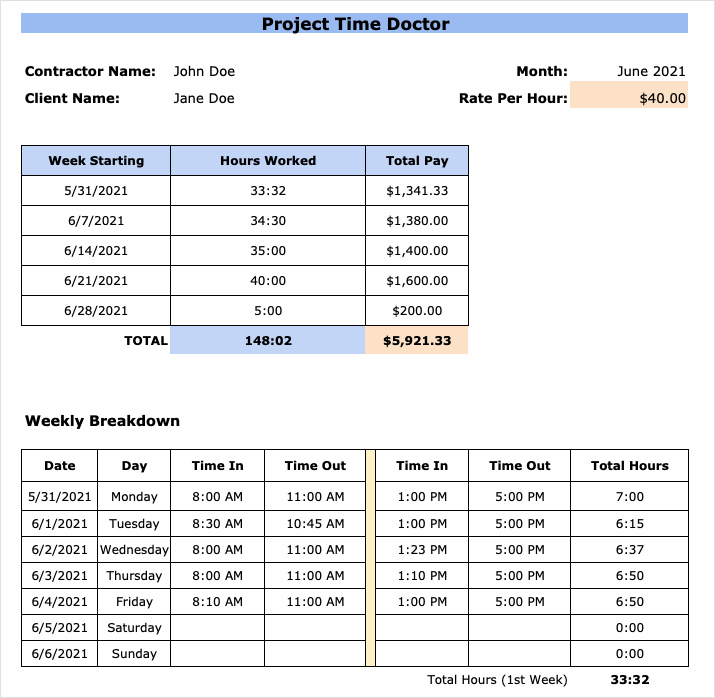When working as an independent contractor, keeping track of your time is crucial for various reasons. Not only does it help you accurately bill your clients, but it also allows you to monitor your productivity and ensure you are being compensated fairly for your work. In this article, we will explore the importance of using an independent contractor timesheet and provide tips on how to effectively utilize one.
What is an Independent Contractor Timesheet?
An independent contractor timesheet is a document used by self-employed individuals to record the amount of time spent on specific tasks or projects. It typically includes details such as the date, start and end times, and a description of the work performed. This timesheet serves as a record of hours worked and is used for invoicing purposes.
Why Should You Use an Independent Contractor Timesheet?
There are several reasons why using an independent contractor timesheet is beneficial:
- Accurate Billing: By tracking your time, you can accurately bill your clients for the work you have completed. This ensures that you are paid for the actual hours worked.
- Transparency: Maintaining a timesheet provides transparency to your clients, allowing them to see the breakdown of the hours and tasks involved in a project.
- Productivity Monitoring: Tracking your time helps you analyze your productivity and identify areas where you may need to improve. It allows you to assess how much time is being spent on different tasks and make adjustments accordingly.
- Proof of Work: In the event of any disputes or discrepancies, an independent contractor timesheet serves as proof of the work you have completed. It can help resolve any misunderstandings and protect your interests.
- Tax Compliance: Maintaining accurate timesheets is essential for tax purposes. The information recorded in your timesheets can be used to support deductions and substantiate your self-employment income.
How to Create an Effective Independent Contractor Timesheet
Creating an effective independent contractor timesheet involves a few key steps:
- Choose a Format: Decide on a format for your timesheet that is easy to understand and use. You can opt for a paper-based timesheet or use one of the many online tools and templates available.
- Include Relevant Information: Make sure to include fields for the date, start and end times, project or task description, and any additional notes or comments.
- Be Consistent: Use your timesheet consistently and record your time accurately. Be diligent in filling out the timesheet regularly to avoid any gaps or inaccuracies.
- Review and Verify: Take the time to review and verify the accuracy of your timesheet before submitting it to your clients or using it for invoicing purposes.
- Keep a Backup: It is always a good idea to keep a backup of your timesheets. This can be in the form of digital copies or physical copies stored in a safe place.
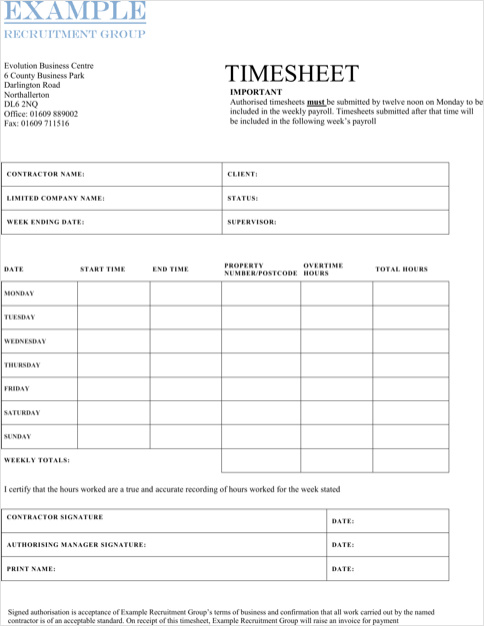
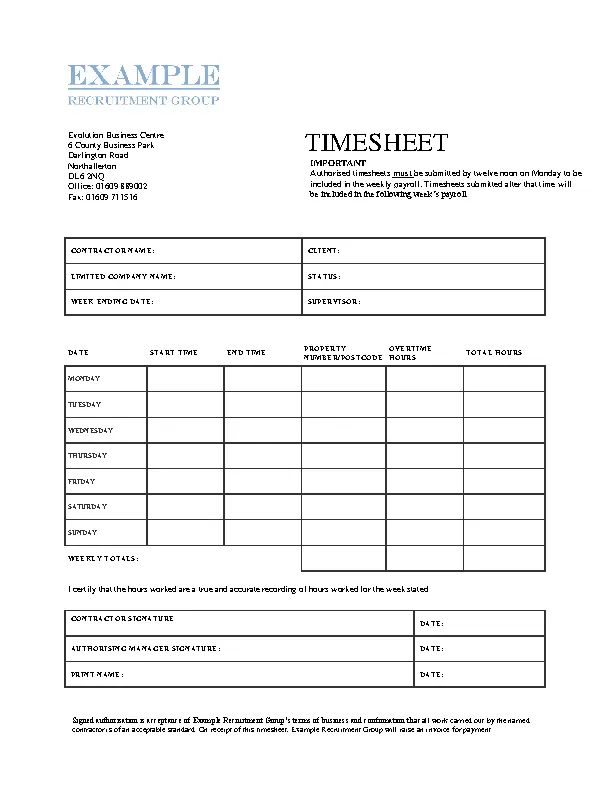
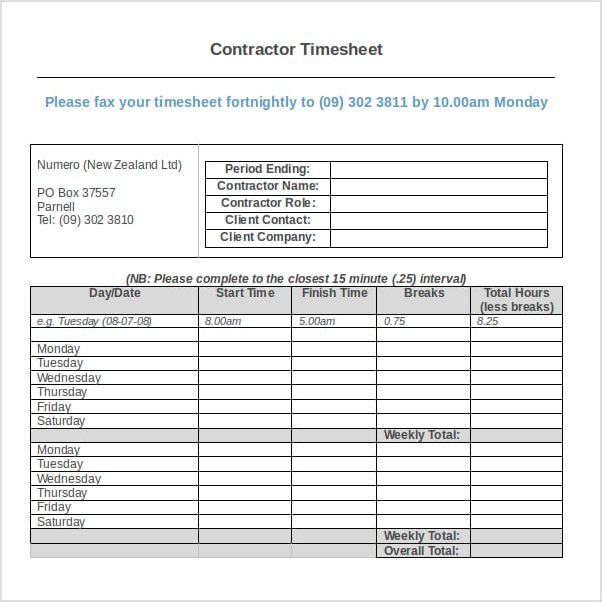
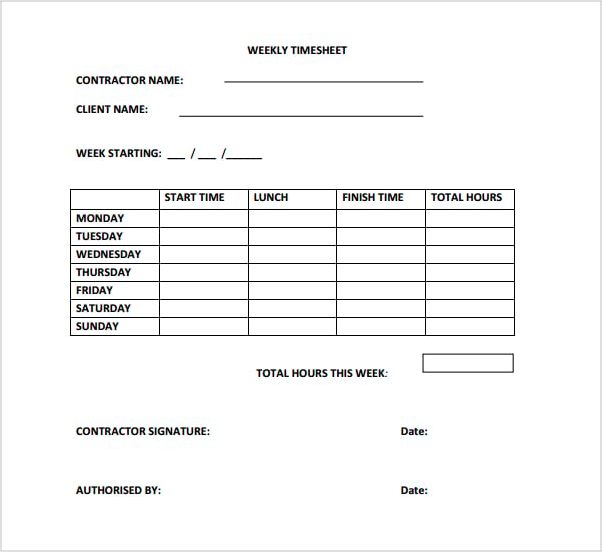
Tips for Using an Independent Contractor Timesheet Effectively
Here are some tips to help you make the most of your independent contractor timesheet:
- Use Time Tracking Software: Consider using time tracking software or apps that can automate the process of recording your time. These tools can streamline the timesheet management process and provide more accurate data.
- Set Realistic Time Estimates: When filling out your timesheet, be realistic with your time estimates for each task or project. This will help you better manage your time and avoid overcommitting.
- Review and Analyze: Take the time to review and analyze your timesheets regularly. Look for patterns or trends in your time allocation and make adjustments as needed to optimize your productivity.
- Communicate with Clients: If there are any discrepancies or changes in your timesheet, communicate with your clients promptly to avoid any misunderstandings.
- Keep Personal and Work Time Separate: It is important to separate personal and work-related activities when tracking your time. This ensures that you are accurately recording billable hours and not including non-work-related time.
- Consult with a Professional: If you are unsure about how to effectively use an independent contractor timesheet or have questions about tax implications, consider consulting with a professional such as an accountant or tax advisor.
The Benefits of Using an Independent Contractor Timesheet
Using an independent contractor timesheet offers several benefits:
- Efficiency: By tracking your time, you can identify areas where you may be spending too much or too little time and make adjustments accordingly. This leads to increased efficiency and productivity.
- Accuracy: Maintaining a timesheet ensures that your billing is accurate and that you are compensated for the actual hours worked.
- Professionalism: Using a timesheet demonstrates professionalism and helps build trust with your clients. It shows that you take your work seriously and are organized and transparent in your business practices.
- Tax Compliance: Accurate timesheets provide the necessary documentation for tax compliance. They support deductions and help ensure that you are reporting your income correctly.
Conclusion
An independent contractor timesheet is a valuable tool for self-employed individuals. It helps with accurate billing, productivity monitoring, and tax compliance. By using an independent contractor timesheet effectively, you can optimize your time management and ensure fair compensation for your work. Make sure to choose a format that works for you, be consistent in recording your time, and regularly review and analyze your timesheets for maximum benefits.
Independent Contractor Timesheet Template – Download
